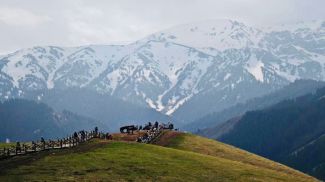ANTARCTICA, 17 March (BelTA - Anadolu Agensy). - Doing scientific research as part of Turkiye's Sixth National Antarctic Science Expedition, Turkish researchers brought back data and findings, but strove to leave behind only their pristine footprints in the snow.
Antarctica, the world's fifth-largest continent with an area of 14.2 million square kilometers (5.5 million square miles), is one of the favorite spots of explorers and scientific research teams with its intriguing geography and nature.
Under the auspices of the Turkish Presidency, and with the Industry and Technology Ministry and the Scientific and Technological Research Institution of Turkiye (TUBITAK) MAM Polar Research Institute, Turkish scientists not only shed light on the future of the earth with their work, but also become protectors of life by preventing the ecosystem of the continent and its surroundings from being damaged.
Turkish scientists carried out their work under the rules laid out in the Antarctic Treaty System, which 54 countries are party to and which entered into force in 1961, and in accordance with the conditions specified in the Antarctic Treaty Environmental Protection Protocol accepted in 2017.
Turkish scientists completed their work within the system in question, preserving the living life on the continent and its surroundings, "leaving a minimal footprint" in line with Environment, Urbanization and Climate Change Ministry regulations based on the 1991 Madrid Protocol, and then returned home.
In Antarctica, the world's coldest continent, only bases where scientific research are carried out are allowed to operate.
Future assurance
Despite its frigid temperatures, Antarctica is home to many animals, including penguins, seals, whales, and birds.
Located in the southernmost part of the earth's southern hemisphere and 98% covered by ice, the continent contains 70% of the world's freshwater resources.
The living marine resources of Antarctica and the freshwater potential hidden inside its glaciers are seen as part of guarantees for the future of the planet.
Keep your distance
One of the most important issues in scientific activities on the continent is interaction with its living inhabitants.
In order not to do any harm, it is mandatory to keep a distance of no less than 10 meters, or nearly 33 feet, from the wildlife on the continent.
Before they ever set foot on the continent, participants in science expeditions are briefed on how important it is to tread carefully among creatures that have never come into contact with humans in their natural lives and to work with minimal noise.
Animals on the continent are more sensitive especially during breeding and spawning periods, so researchers are told that if an animal approaches, slowly increase the distance without frightening them, or else stay still and let the animal go on its way.
Environmental officers
Atilla Yilmaz, the expedition's environmental officer and researcher from TUBITAK MAM Polar Research Institute, told Anadolu Agency that Antarctica has a unique ecosystem, and they want to keep it that way.
"We try to have an environmental officer in order to observe the environmental rules on our expeditions. This person usually inspects whether the work carried out in the field follows the rules of the region and takes responsibility for the response in case of an environmental accident. This process starts before the expedition.”
“Participants must get various permits to do research on the continent and take samples. The competent authority in this regard is the Environment, Urbanization and Climate Change Ministry. We also ensure coordination between expedition participants and the ministry before the expedition.”
No invasive species
Noting that they work to not disturb the animals they come across during their work, Yilmaz said:
"It's very important that non-native species aren't brought here from other continents in order to protect the ecosystem. We disinfect our boots with a special solution as soon as we step off the plane and set foot on the continent.
“We repeat this every day when we leave the ship and come back to the ship to do fieldwork. We do our best to protect the environment of Antarctica on our science expeditions, and we strive to leave a truly minimal footprint on the continent."













